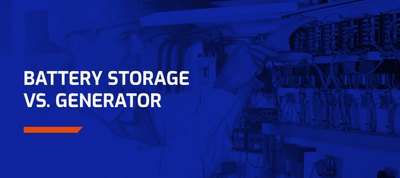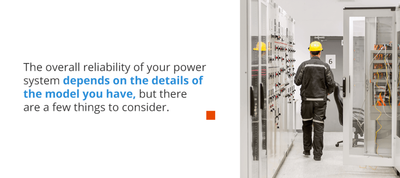Battery Storage vs. Generator

Modern life relies more and more on having a constant power source readily available. Power grid failures, natural disasters and other emergencies that cut off power to our homes are more inconvenient than ever with all the home devices that rely on electricity. Power outages can go beyond inconvenience and become a safety issue with power loss in refrigerators, security systems, lighting and more.
Table of Contents
Home generators and battery backup for home systems are two of the most popular methods of safeguarding against power failure. Here’s everything you should know about these two types of power backup systems:
1. How They Work
Both home generators and home batteries are used to provide extra power to a home during an outage, emergency or higher-cost peak energy hours.
How Does a Home Generator Work?
When a power outage occurs, an automatic transfer switch starts up the generator and disconnects the home from the utility grid. The generator is then used to automatically power the home during the outage. Home generators use some type of fossil fuels, like gasoline, natural gas or diesel to power an internal combustion engine. When the power is restored, the generator turns back off and the home automatically switches over to being powered by the grid again.
How Does a Home Battery Work?
A home battery is similar to a home generator system in that it can be used to power a home in an emergency, but the difference is that a home battery system doesn’t produce its own power — it stores power from other sources to use later. A home battery storage system draws power from the grid, or can be used in conjunction with solar panels, and it saves this power for when it is needed. In the event of an emergency or outage, the system automatically disconnects from the utility grid and draws power from the battery for the home. When the power comes back on, the system switches back to power provided by the grid, and the battery has an opportunity to recharge itself.
2. Cost
In general, the cost to purchase a home battery is higher than a home generator, but there’s more to the cost than the initial purchase price. When all things are considered, the lifetime cost may be quite similar.
Cost of a Home Generator
Home generators have a much lower upfront purchase price than battery systems. Prices can vary depending on the model and the type of fuel the engine uses. After the initial purchase, home generators also need to be refueled regularly. They may be connected to a natural gas line, or require deliveries of fuels like diesel or propane. Accordingly, you’ll pay the rate for fuel, and in some cases delivery fees. Generators will also need regular maintenance to ensure they are working properly, so factor these checkups into the total cost as well.
Cost of Home Battery Systems
The upfront cost of a new home battery system can be a larger investment, especially if you are also adding solar panels to your system. Home batteries are relatively new and their production cost is high, although this may lower with time as they become more popular. After the initial cost, there is no fuel needed and very little maintenance necessary, so the operating cost is quite low. There also may be federal, state and local incentives for installing home battery systems.
3. Reliability
When the power goes out, you want to be able to rely on your backup power system if you’re unable to complete emergency repairs quickly. The overall reliability of your power system depends on the details of the model you have, but there are a few things to consider. How long your backup power system can last will also depend on the amount of power your home is using.

Reliability of Home Generators
Home generators can run on their own for extended periods of time if needed. As long as you have a fuel supply, the generator can keep running. If the generator is hooked up to a natural gas line, it can run as long as you need. If you are filling up the gas tank yourself, it will run as long as the fuel allows. Be sure to keep up with any regular maintenance, so you don’t run into mechanical problems when you need your generator most.
Reliability of Home Battery Systems
A home battery will keep running as long as there’s power stored in the system, but they have some limitations as to how much power they can store. So, this may not be the best option for a power-hungry home that needs backup power for days at a time. However, a home battery system that is connected to solar panels may be able to run much longer because it can recharge each day with the solar power. It’s also possible to purchase multiple batteries to extend the length of time the system can provide power, but this can be quite costly.
4. Environmental Impact
Today, the environment is a concern for everything we do, and it’s necessary to consider the environmental impact of our backup power systems.
Environmental Impact of Home Generators
Home generators that run on fossil fuels release carbon dioxide and other forms of air pollution into the air when the engine is running. As such, they are not the most environmentally friendly option for power generation.
Environmental Impact of Home Battery Systems
A home battery system eliminates the need for fossil fuels in your backup power and does not emit carbon dioxide and other pollution. Although this assumes that the home battery backup power supply is attached to your own solar panels or is charged from clean energy on the grid. If the battery is charged from utility power, it likely comes in large part from power plants that use some type of fossil fuels. Home battery systems with solar panels can help to reduce your overall carbon footprint.
Generator Installation From Lippolis Electric
If you’re considering a backup generator for your home, the team at Lippolis Electric is happy to help you choose and install a generator. We’ve provided expert electrical work to Westchester County for more than 30 years. Our team of experienced, licensed professionals is ready to install or service your home generator. If you’d like more information about generator service and installation, get in touch with the team at Lippolis Electric today through our online contact form, or by calling 914-827-6383.
Schedule service
Please note that your appointment is not set until confirmed by Lippolis Electric shortly after you've submitted the form.
| ‹ | › | |||||
| Sun | Mon | Tue | Wed | Thu | Fri | Sat |


